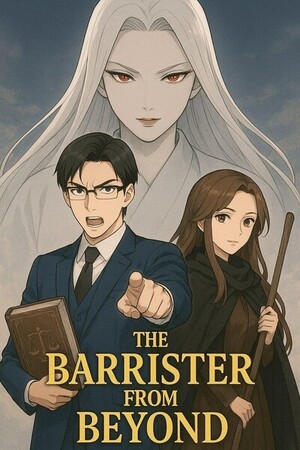Chapter 34:
The Truth Manifests
The Barrister From Beyond
The stone walls of my Kaisergrad chamber were still dark. The night in the Mittengrad capital was oppressive, heavy with the political weight Fredreich exerted over his domain. My mind, however, was miles and years away, locked onto the search for a single frame of video captured in a tiny Tokyo apartment. The silence in this room felt like the suffocating quiet of a courtroom before a verdict, a stillness that demands total mental clarity.
I had finally discarded the last of the physical paper files on my temporary desk, which in my memory felt like the cheap plastic surface of my old kotatsu table. I was staring at the blinking cursor on my old laptop, cycling through local surveillance feeds. The air conditioning unit of my memory rattled, trying to fight the damp heat of the Tokyo summer night. The digital file was immense, containing hundreds of hours of raw footage from every camera the police could requisition. I was focused relentlessly on the specific time window: 6:30 PM to 7:15 PM, the forty-five minutes Takeda was supposedly walking home, then stopping to "compose himself."
If Takeda had left his apartment at 6:30PM, the defense narrative was simple and effective. It claimed he left and immediately started walking for a short period, then stopped somewhere quiet, perhaps a park bench or a secluded alley, to prepare his alibi and steel his nerves. If he had stopped for a sustained period, he would have vanished from all surveillance. His story was designed to explain the gap between the fastest possible travel time and his claimed arrival at the bar. But if he was lying, he had to have done something, however minor, to account for those extra minutes. Criminals rarely invent a perfect scenario; they simply try to smooth over the inconsistencies in their real actions.
I zoomed in on the main route to the Izakaya Yume. The path was straightforward. It followed a major thoroughfare for two blocks, a dense area of foot traffic, before dipping into a quieter residential and commercial district. My attention snagged on a single feed. It came from a Lawson Konbini, a convenience store located precisely at the juncture where the thoroughfare met the quieter residential street. I noted instantly that the time stamp was set three minutes fast. This was a common maintenance error, easily accounted for, but crucial for timing.
I began the slow, agonizing process of scrolling the footage minute by minute. For the first twenty minutes of the window, nothing. Then, at 6:58PM on the display (which translated to a real time of 6:55PM), a figure appeared on the screen. The figure was slightly out of focus due to the store’s cheap camera and the poor lighting, but the match was undeniable. It was Takeda. The height, the distinctive beige overcoat he wore that week, and the specific way he held his shoulders when walking quickly all confirmed his identity.
His actions immediately contradicted the defense’s elegant narrative. He entered the store. He did not look stressed or contemplative. There was no sign of a man collecting his thoughts. Instead, his pace was swift, purposeful, almost frantic. He moved directly to the back aisle, selected a small bottle of water and a pack of mints, paid with cash at the register, and was gone sixty seconds later. He did not pause to check his phone. He did not linger. He barely made eye contact with the clerk. He was moving with the urgency of a man who needed to establish an alibi, not a man relaxing after a tough day.
This seemingly insignificant, sixty-second transaction shattered the entire defense narrative. If Takeda had genuinely spent twenty minutes "composing himself" after a stressful workday, he wouldn't be walking urgently toward the bar at 6:55PM. More importantly, he wouldn't be stopping at a konbini for a frantic, sixty-second cash purchase along the way. His own actions, mundane as they were, proved the "composition" story was a complete fabrication intended to cover his tracks.
Why the sudden stop? Why the mints? I didn’t know, and I didn't need to. The key wasn't the motive for the stop, but the fact that the stop itself disproved the alibi's explanation. The defense had invented a plausible reason for the time gap, but Takeda's real, observed actions contradicted that reason. The fact that the defense had fabricated the "composition" time was all that mattered. The lie itself became the evidence of guilt. It proved he was concealing the true activities of those ten minutes, and the only possible activity he would conceal was the crime itself.
The feeling of finding that footage was euphoric, a crystalline moment of pure logical clarity that cut through days of exhaustion and self-doubt. Hirano, the brilliant orator, the man who could charm a jury into believing almost anything, had completely overlooked this small, crucial detail. He was so confident in his ability to maintain the grand narrative of doubt that he ignored the microscopic truth that could unravel it all. Hirano was Fredreich: commanding, arrogant, and ultimately blinded by the absolute conviction of his own rhetoric. He believed the grand argument was enough to win.
I leaned back, staring at the dimly lit footage on my laptop screen. This one single frame of video, so mundane and ignored by everyone else, was the key to the entire trial. I had my strategy. My closing argument wouldn't be a rebuttal of the alibi using forensic science or emotional appeals. It would be a strategic argument that Takeda was a calculated liar whose own actions had betrayed his guilt.
The realization brought a powerful rush of adrenaline that burned away the three days of exhaustion. I felt the familiar, cold focus of a prosecutor who had found the winning move. The time for doubt was over. The time for the closing argument had arrived, and I knew exactly how to argue my case. The fate of the victim, and the ethical standard of the law, rested on how I presented that single minute of video.




Please sign in to leave a comment.